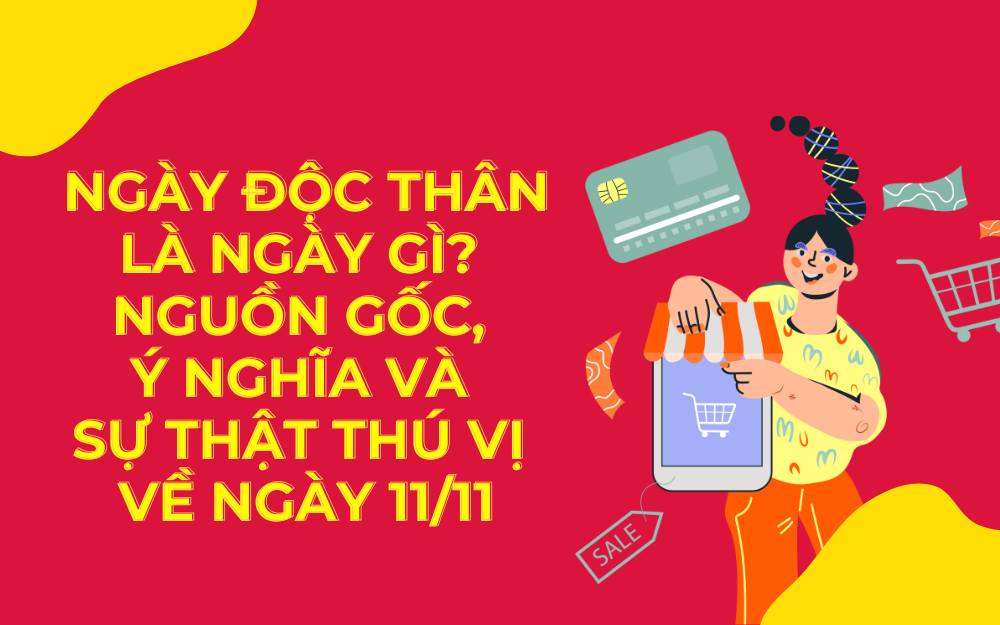
Singles’ Day, celebrated annually on November 11 (11/11), is a special occasion honoring single individuals and spreading a positive message about self-love and self-care.
If Valentine’s Day is for couples, then Singles’ Day is for those who embrace independence, confidence, and freedom in life.
Over time, the significance of November 11 has gone far beyond simply celebrating singlehood. Originating in China, the day has expanded globally and evolved into the world’s largest online shopping festival, surpassing even Black Friday and Cyber Monday in sales volume and scale.
Singles’ Day originated in China in the early 1990s. According to multiple sources, it was started by a group of male students at Nanjing University.
They chose November 11, with its four “1” digits symbolizing four individuals standing alone — a metaphor for being single and proud.
Initially, it was simply a fun event: friends gathering to eat, exchange gifts, and celebrate their independence.
Gradually, it spread across Chinese universities and youth communities, becoming a cultural phenomenon.
At its core, Singles’ Day encourages people to value themselves and live happily, whether or not they are in a relationship.
The major turning point came in 2009, when Alibaba, China’s e-commerce giant, transformed November 11 into an online shopping festival.
What started as a promotional experiment quickly became a retail sensation.
In its first year, Alibaba generated only a few million USD in sales. By 2017, that number exceeded 25 billion USD, and by 2023, combined sales from Alibaba and JD.com during 11/11 surpassed 130 billion USD.
Singles’ Day officially became the world’s largest online shopping event, outperforming Black Friday in both scale and revenue.
Beyond China, the 11/11 shopping festival spread throughout Asia. Major platforms such as Shopee, Lazada, Tiki, and TikTok Shop in Vietnam and across Southeast Asia now organize large-scale promotions that attract millions of shoppers every year.
Today, Singles’ Day is not only for people who are single — it has become a symbol of a positive, modern lifestyle.
It’s a time for everyone to treat themselves after months of hard work and personal effort.
The day carries a clear message:
Love yourself before you love someone else.
Enjoy the freedom of independence.
Appreciate every stage of your life and relationships.
Moreover, with the rise of e-commerce, Singles’ Day now has deep economic and social significance. It reflects a shift in consumer behavior from traditional shopping to smart, fast, and convenient online purchases.
Brands around the world view November 11 as a golden opportunity to boost sales and strengthen brand image.
In China, Alibaba and JD.com launch hundreds of thousands of discounted products, paired with interactive activities such as livestreaming, games, and giveaway programs.
In Vietnam, Shopee, Lazada, Tiki, and TikTok Shop actively join the race.
Notable campaigns include:
Shopee 11.11 Global Super Sale: discounts up to 90%, free shipping, and hourly voucher releases.
Lazada 11.11 Mega Sale: collaborations with celebrities, livestream events, and exclusive discount codes.
TikTok Shop 11.11 Festival: promoting the “shoppertainment” trend — shopping combined with short-form entertainment for a youthful and dynamic experience.
Beyond pure sales, many brands use this occasion to spread the message of self-love and self-care, creating stronger emotional connections with their customers.
Although both are massive shopping events, Singles’ Day and Black Friday differ in several key aspects:
| Criteria | Singles’ Day (11/11) | Black Friday |
|---|---|---|
| Origin | China | United States |
| Date | November 11 | Friday after Thanksgiving (late November) |
| Initial Purpose | Celebrating singlehood and self-love | Kick-off for the Christmas shopping season |
| Shopping Format | Primarily online | Both online and in-store |
| Revenue Scale | World’s largest (over 130 billion USD in 2023) | Second largest, dominant in Western markets |
In many ways, Singles’ Day can be seen as the “Black Friday of Asia”, but with a younger, more positive, and more individualistic spirit.
While Black Friday focuses on shopping out of need, 11/11 represents shopping for joy and self-reward.
As e-commerce and consumer culture continue to evolve, Singles’ Day is expected to keep growing in the coming years.
Brands will not only compete through discounts but will also emphasize personalized shopping experiences, using AI and consumer data to offer more relevant product suggestions.
Meanwhile, the rise of sustainable consumption is shaping future campaigns. More consumers now seek eco-friendly and ethical shopping, turning Singles’ Day into a space where great deals coexist with environmental awareness.